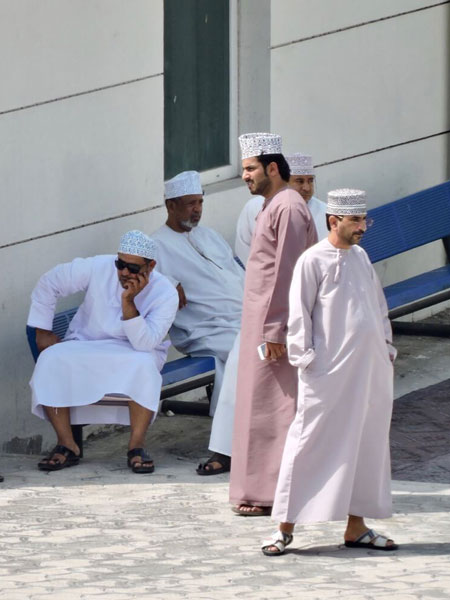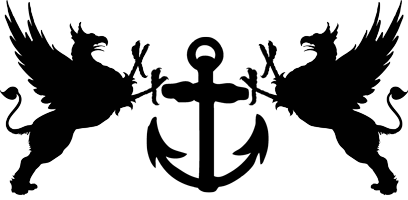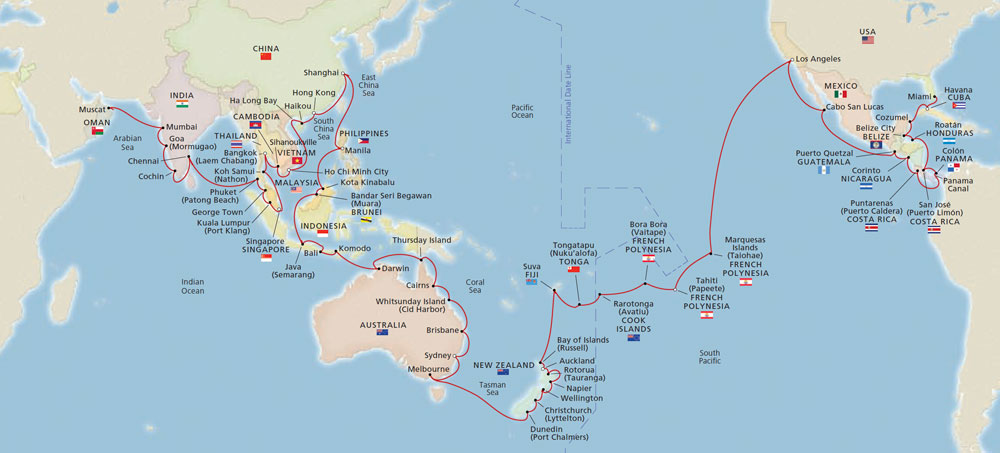
Muscat, Oman
Muscat, Oman
Docked at Sultan Qaboos Port
Latitude 23.63 Degrees North and
Longitude 58.57 Degrees East
April 10th, 2018
Weather: Mostly Sunny With Light Breeze and High of 90 Degrees With Low Humidity
Author: Don
Today we docked at the historic port city of Muscat, Oman. Muscat has been an important trading hub between the Middle East, Europe and southeastern Asia for centuries. At one time Muscat was a Portuguese trading outpost with defensive forts and watch towers built in the late 1500s. For European traders, Muscat is strategically located on the way to India and China.
Muscat is the capital of Oman on the eastern tip of the Arabian Peninsula and has a population of 1.5 million. This city of low, whitewashed buildings is dramatically nestled among the valleys and canyons of the rocky Western Al Hajar Mountains along the Gulf of Oman by the Arabian Sea. By law, no building may be taller than 14 stories. Traditional dhow fishing boats still frequent its harbor, though now they may carry tourists instead of fishing nets.
Today's included tour visited the giant Sultan Qaboos Grand Mosque, named for the country's beloved ruler. Opened in 2001, this mosque built of dazzling white marble, intricate wooden panels and stained-glass windows has a 20,000 worshipper capacity. It also has a remarkable 45,000 square-foot one-piece carpet that was hand made in Iran.
The Mutrah Souq was toured also. (Souq means “market”.) It is perhaps one of the oldest marketplaces in the Arab world, dating back to Muscat's centuries old trading history. An interesting museum of Oman historical and cultural artifacts was also visited, but no photos were permitted inside.
Oman is a wealthy country. Since the ascension of Qaboos bin Said as Sultan of Oman in 1970 (and subsequent exploitation of Oman's oil reserves), the city has experienced rapid infrastructural development that has led to the growth of a vibrant economy and a multi-ethnic society. Omanis' prosperity is apparent. Unlike what we observed all over India, the city is very clean, uncrowded and well-maintained. Citizens may be fined for driving an unwashed vehicle. Few motor scooters were seen by us, since everyone can afford a car. In fact, many average families own three cars. Oman is an almost entirely Muslim country, but various versions of Islam are accepted and coexist.
Sultan Qaboos' two massive private yachts were prominently docked in front of the city, within sight of our ship. Today's tour guide said two things are rare in Muscat: rain and sightings of Sultan Qaboos. The Sultan is now old, in ill health and has no children. (In fact, he is in Belgium right now, receiving medical care.) Oman's next Sultan has not been made known yet. The country's primary source of wealth, its oil, is projected to be mostly depleted within the next 20 years. This has been one of the more stable Arab countries. Let's hope it continues to be.
Two nights ago, we spotted dolphins swimming alongside our ship in the Arabian Sea, and today we spotted a sea turtle as we left Muscat's harbor. Humpback whales also are known to live in this part of the Arabian Sea. We hope to see one or two on our way to the Red Sea and Jordan.
-
 Arched Corridor Inside Grand MosqueArched Corridor Inside Grand Mosque
Arched Corridor Inside Grand MosqueArched Corridor Inside Grand Mosque -
 At Sultan's Grand MosqueAt Sultan's Grand Mosque
At Sultan's Grand MosqueAt Sultan's Grand Mosque -
 Central Dome Chandelier In Grand MosqueCentral Dome Chandelier In Grand Mosque
Central Dome Chandelier In Grand MosqueCentral Dome Chandelier In Grand Mosque -
 Decorated Arch In Grand Mosque ComplexDecorated Arch In Grand Mosque Complex
Decorated Arch In Grand Mosque ComplexDecorated Arch In Grand Mosque Complex -
 Decorated Arch In Mutrah SouqDecorated Arch In Mutrah Souq
Decorated Arch In Mutrah SouqDecorated Arch In Mutrah Souq -
 Decorated Ceiling In Mutrah SouqDecorated Ceiling In Mutrah Souq
Decorated Ceiling In Mutrah SouqDecorated Ceiling In Mutrah Souq -
 Entrance To Grand Mosque ComplexEntrance To Grand Mosque Complex
Entrance To Grand Mosque ComplexEntrance To Grand Mosque Complex -
 Entrance To Mutrah SouqEntrance To Mutrah Souq
Entrance To Mutrah SouqEntrance To Mutrah Souq -
 Frankincense for SaleFrankincense for Sale
Frankincense for SaleFrankincense for Sale -
 Grand Mosque DomeGrand Mosque Dome
Grand Mosque DomeGrand Mosque Dome -
 Grand Mosque Prayer RoomGrand Mosque Prayer Room
Grand Mosque Prayer RoomGrand Mosque Prayer Room -
 Guide Inside Grand MosqueGuide Inside Grand Mosque
Guide Inside Grand MosqueGuide Inside Grand Mosque -
 Inside Sultan Qaboos Grand Mosque ComplexInside Sultan Qaboos Grand Mosque Complex
Inside Sultan Qaboos Grand Mosque ComplexInside Sultan Qaboos Grand Mosque Complex -
 Muscat Royal Opera HouseMuscat Royal Opera House
Muscat Royal Opera HouseMuscat Royal Opera House -
 Muscat Taxi Drivers Waiting At PortMuscat Taxi Drivers Waiting At Port
Muscat Taxi Drivers Waiting At PortMuscat Taxi Drivers Waiting At Port -
 Mutrah Fort (Built 1580 By Portuguese)Mutrah Fort (Built 1580 By Portuguese)
Mutrah Fort (Built 1580 By Portuguese)Mutrah Fort (Built 1580 By Portuguese) -
 Oman's Official Emblem On Gate To Sultan's Royal PalaceOman's Official Emblem On Gate To Sultan's Royal Palace
Oman's Official Emblem On Gate To Sultan's Royal PalaceOman's Official Emblem On Gate To Sultan's Royal Palace -
 Outside Grand Mosque ComplexOutside Grand Mosque Complex
Outside Grand Mosque ComplexOutside Grand Mosque Complex -
 Portuguese-Built Watch Towers Above Muttrah District Of MuscatPortuguese-Built Watch Towers Above Muttrah District Of Muscat
Portuguese-Built Watch Towers Above Muttrah District Of MuscatPortuguese-Built Watch Towers Above Muttrah District Of Muscat -
 Pretty Exotic Things For SalePretty Exotic Things For Sale
Pretty Exotic Things For SalePretty Exotic Things For Sale -
 Riwat District Of MuscatRiwat District Of Muscat
Riwat District Of MuscatRiwat District Of Muscat -
 Riyam Park Tower (AKA The Giant Frankincence Burner)Riyam Park Tower (AKA The Giant Frankincence Burner)
Riyam Park Tower (AKA The Giant Frankincence Burner)Riyam Park Tower (AKA The Giant Frankincence Burner) -
 Royal Court Buildings At Sultan's PalaceRoyal Court Buildings At Sultan's Palace
Royal Court Buildings At Sultan's PalaceRoyal Court Buildings At Sultan's Palace -
 Spice MerchantSpice Merchant
Spice MerchantSpice Merchant -
 Spice Stall Inn Mutrah SouqSpice Stall Inn Mutrah Souq
Spice Stall Inn Mutrah SouqSpice Stall Inn Mutrah Souq -
 Stained Glass Inside Grand MosqueStained Glass Inside Grand Mosque
Stained Glass Inside Grand MosqueStained Glass Inside Grand Mosque -
 Stained Glass Window On Grand MosqueStained Glass Window On Grand Mosque
Stained Glass Window On Grand MosqueStained Glass Window On Grand Mosque -
 Stall In Mutrah SouqStall In Mutrah Souq
Stall In Mutrah SouqStall In Mutrah Souq -
 Sultan Qaboos Image On Side Of Apartment BuildingSultan Qaboos Image On Side Of Apartment Building
Sultan Qaboos Image On Side Of Apartment BuildingSultan Qaboos Image On Side Of Apartment Building -
 Sultan's Palace and Al Jalali Fort Seen As We Sail AwaySultan's Palace and Al Jalali Fort Seen As We Sail Away
Sultan's Palace and Al Jalali Fort Seen As We Sail AwaySultan's Palace and Al Jalali Fort Seen As We Sail Away -
 Sultan's PalaceSultan's Palace
Sultan's PalaceSultan's Palace -
 Sultan's Private Yacht In Muscat HarborSultan's Private Yacht In Muscat Harbor
Sultan's Private Yacht In Muscat HarborSultan's Private Yacht In Muscat Harbor -
 Tiled Ceiling Inside Grand mosqueTiled Ceiling Inside Grand mosque
Tiled Ceiling Inside Grand mosqueTiled Ceiling Inside Grand mosque -
 Touristy Stuff For SaleTouristy Stuff For Sale
Touristy Stuff For SaleTouristy Stuff For Sale -
 Very Full Stall In Mutrah SouqVery Full Stall In Mutrah Souq
Very Full Stall In Mutrah SouqVery Full Stall In Mutrah Souq -
 Volumes of The Qur'an Inside Grand MosqueVolumes of The Qur'an Inside Grand Mosque
Volumes of The Qur'an Inside Grand MosqueVolumes of The Qur'an Inside Grand Mosque

